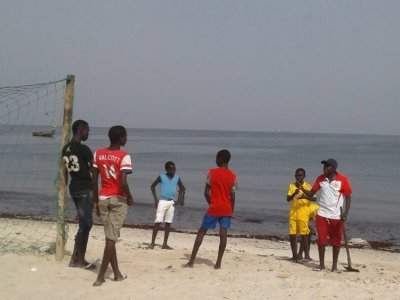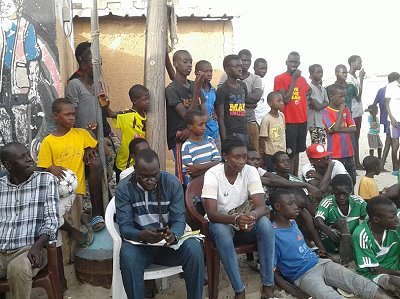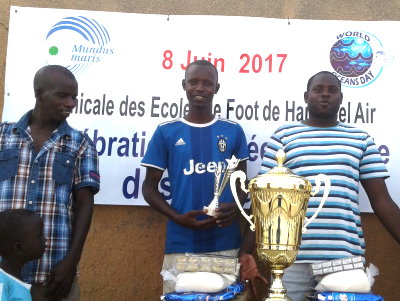 Alassane Diallo es el segretario de relaciones públicas e información del centro de formación de fútbol llamado "Maison Foot", con sede en la comunidad pesquera de Hann. Él nos dio una entrevista sobre la importancia del deporte en la protección del medio ambiente (especialmente el fútbol) en el Club Mundus maris Senegal. Lea lo que quería compartir desde su experiencia:
Alassane Diallo es el segretario de relaciones públicas e información del centro de formación de fútbol llamado "Maison Foot", con sede en la comunidad pesquera de Hann. Él nos dio una entrevista sobre la importancia del deporte en la protección del medio ambiente (especialmente el fútbol) en el Club Mundus maris Senegal. Lea lo que quería compartir desde su experiencia:
MM: Mr Diallo, this is the fourth year that, on behalf of your training center, you celebrate World Oceans Day with Mundus maris. Please explain your interest in this event.
AD: You know, for the whole of Hann Bel Air municipality, which is the part of our community economically and culturally most dependent on fishing, it is the only event with an international dimension that addresses an ocean topic, an ecosystem that is vital to our people. And that event is held annually, at a fixed date. This constitutes a good means of social communication in favour of the oceans and especially of our bay (the Bay of Hann), which is badly polluted.
MM: Can you explain how the event itself is an effective means of social communication, with impacts, as you are referring to the pollution of the Bay?
 AD: You know, there are a number of factors that have contributed to the degradation of the health of the oceans, such as the dumping of household waste, polluting products from shore industries, from petroleum shipping and so on. As the ocean returns to us all that it can not digest, among other consequences, our Bay is polluted. Once it was one of the most beautiful bays to be compared to that of Rio. Unfortunately, it is no longer enjoyable. This is why such an event attracts the attention of the residents of the Bay, for whom World Oceans Day is the only "alert" event that is organised periodically, every year, on a date in our agenda.
AD: You know, there are a number of factors that have contributed to the degradation of the health of the oceans, such as the dumping of household waste, polluting products from shore industries, from petroleum shipping and so on. As the ocean returns to us all that it can not digest, among other consequences, our Bay is polluted. Once it was one of the most beautiful bays to be compared to that of Rio. Unfortunately, it is no longer enjoyable. This is why such an event attracts the attention of the residents of the Bay, for whom World Oceans Day is the only "alert" event that is organised periodically, every year, on a date in our agenda.
MM: How do you explain the decision of your Centre “Maison Foot” to organise the 2017 World Oceans Day event in broader framework of collaboration - between Mundus maris and the Friendly of all soccer schools of Hann Bel Air - going beyond the usual partnership with your centre?
AD: It is for the sake of impact. What we can achieve as an isolated training centre, we can do better with this Friendly group of 19 soccer schools in our municipality.
MM: You keep stressing the importance of continuing to involve sports players in these types of initiatives for the protection of our environment in general, and the protection of the oceans and Hann Bay in particular. Can you explain a bit more?
AD: I do not know if it is the same in the other countries around us, but in Senegal, sports, in order of importance soccer and wrestling, are the two most effective vectors for any message to be conveyed to the populations, irrespective of who issues the message: politicians, environmental activists, etc.
 The main explanations for football are: (i) we have more than half of our very young population who are passionate about playing ball; (ii) faced with the unlikely social advancement through ordinary schools with a high dropout rate in Hann, soccer can be a social elevator because we have young people out of our schools, who play in clubs on the African continent and even in Europe, with salaries beyond their own expectations. This not to mention the fact that the trophies offered each year by Mundus maris are rare here, never offered to our competitors. This is a stimulus for schools that often lack competition.
The main explanations for football are: (i) we have more than half of our very young population who are passionate about playing ball; (ii) faced with the unlikely social advancement through ordinary schools with a high dropout rate in Hann, soccer can be a social elevator because we have young people out of our schools, who play in clubs on the African continent and even in Europe, with salaries beyond their own expectations. This not to mention the fact that the trophies offered each year by Mundus maris are rare here, never offered to our competitors. This is a stimulus for schools that often lack competition.
MM: Do you want to add anything else to the contribution of sport towards efforts to improve the health of our environment in general?
AD: Yes, because there's one thing I forgot. You know, there's something that may be a bit ridiculous for some that I'm going to say, namely "It's with the tournaments organised by Mundus maris that many of our young soccer pupils are realising the relationship between a healthy environment and practical sport". As is the practice on World Oceans Day to begin with a beach cleaning followed by a Mundus maris-sponsored tournament, young people are becoming aware that it is not possible to practice sport in a degraded environment. Thus, to be able to practice continuously - essential for a soccer player who wants to keep fit - his own environment (beach or bay) must be looked after.
MM: Do you have comments on any limitations in the collaboration and suggestions for iits future mprovement?
AD: Yes, of course. Nothing is perfect. I believe that the constraints placed on our partnership programme revolve around three points: (i) the need to be more ambitious and without fear by raising the profile of this event at the level of the Hann Bel municipality through a large press conference at the end of each edition; (ii) to do everything possible so that the fishers express themselves during this conference on the relations between the health status of our marine ecosystems and current challenges for the fishing communities; but also and especially – even if it is going to be more difficult. (iii) Finally, as far as future prospects are concerned, we would like Mundus maris, within the limits of its possibilities, to facilitate contact with certain professional providers of equipment - especially football - for the exclusive needs of World Oceans Day. If this were to happen we would benefit by better highlighting the contribution of football to the protection of the environment. But also for these societies, it would be a way to promote them among young people for whom football is one of the ways out of the conditions in which they live.
Interviewed on June 18, 2017 by the Club Mundus maris - Senegal








